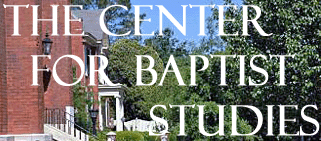|
Encouraging scholarship, strengthening faith identity, and interpreting contemporary issues in Baptist life. |
|||
 |
|
Baptist Freedom |
|
|
Home • Staff • Local Church • News & Views • Issues • Bulletin • Conferences / Seminars • Sabbaticals • Certificate • Links |
|||
|
by Dr. Bruce Prescott Speaking for Mainstream Baptists is a hazardous undertaking. We deny that any human understanding of the Bible can be so exhaustive and authoritative as to merit use as an "instrument of doctrinal accountability." Mainstream Baptists think it more prudent to leave every believer free to interpret the Bible according the dictates of a conscience that is guided by the Holy Spirit. Though Mainstream Baptists insist on thinking for themselves, I believe there is a broad consensus among us concerning the scriptures. This is one Mainstream Baptist's attempt to articulate our regard for the Bible. Mainstream Baptists love and respect the Bible. It is a holy book in that it holds a separate and unique place in our lives. It is the story of God's love. We are part of that story. We identify with this story and it gives meaning and direction to our lives. While Baptists love and respect the Bible, we do not worship it. The Bible is the written word of God. In and of itself it is paper and ink, words and sentences, and has no life. The Bible is not the supreme revelation of God. It points to and must be fulfilled and completed by God's Living Word. Jesus Christ, the Living Word, is the one mediator between God and man. He gives scriptures life by creating from them a spark of understanding in our hearts. From that understanding He calls us to a personal relationship with Him. Those who respond in faith to God's call, identify with His story and commit themselves to a life of discipleship. For them, the Bible becomes more than a reliable record of God's revelation in the past. It is the authoritative tradition from which we view the horizons of life in both time and eternity. We believe in its divine inspiration and its human authorship. The story of God's love recorded in the Bible was written by men, but it is God's story. It is the story of the God who created us, gave us life and loved us enough to reveal himself and die for us. Some of the encounters between God and mankind have been documented in written records. We believe that the Spirit of God filled and inspired the writers of the documents that are collected in the Bible. The language, words, and style in which each human author wrote reflects his own individual and unique pattern of thought and understanding. The meaning and significance of what they wrote, however, transcends their own personal purposes and individual intentions and serves the purposes and intentions of God.
"Salvation is not conditioned upon our belief in, or acceptance of, a book. . . . God's revelation of himself comes through his direct action upon our spirits. . . . God thus becomes our supreme authority and the Bible is recognized as the authoritative record of his supreme revelation. . . . What is our supreme source of the knowledge of God . . . The answer is the revelation of God in and through Jesus Christ." -- E.Y. Mullins E.Y. Mullins was president of Southern Seminary 1899-1928, president of the SBC 1921-24, and was the chief author of the 1925 Baptist Faith & Message statement.
We affirm the process of its canonization and the integrity of its text. The story of God's love was revealed and recorded progressively through history. The documents of the Bible were written over a great span of time. People collected those documents to form the single composition that we know as the Bible. We believe that the Spirit of God filled the people who collected the documents and directed the process by which texts were selected to compose our scriptures. We affirm that the entire compiled text, in its parts and as a whole, is the authoritative canon for our beliefs and practices. We humbly recognize the inexhaustibility of its meaning. Scripture has a surplus of meaning. It always means more than what people can understand or embody. Jesus alone fully comprehended and perfectly embodied its truth. Christ alone has ultimate authority in the life of the believer. No human creed, confession, interpretation, exposition, or application of scripture has finality. The scriptures must always be approached with a sense of humility. Our minds must be sensitive to the limitations of human understanding and our hearts must be open to the guidance of God's Spirit. We affirm the literal interpretations that ground our faith. Understanding is initially grounded in a straightforward acceptance of the history and truth of the biblical story of God's love. Faith begins as an unquestioning response to the Truth of the gospel. As the "good news" of God's love is presented to us, God's presence appears directly and immediately in our consciousness. We hear God's call individually and feel His claim on our lives personally. We give ourselves to God completely and without reserva-tion. This unquestioning, childlike trust and acceptance is the foundation of our relationship with God. Without it there is no faith. We affirm the critical interpretations that stretch our faith. Faith and understanding are stretched by struggling through disorientation and doubt. Faith grows in moments of adversity and suffering. During these times, God seems distant and absent from us. Those moments test our convictions, develop our character, and stretch our faith. Understanding grows when meaning seems distant and we ask probing questions. Serious questioning requires discipline. Faithful students of the Bible are developing several disciplines which make careful and deliberate inquiry of the scriptures. Each discipline looks at the Bible from a different perspective. Like scientific disciplines that make discoveries by developing and utilizing tools like microscopes or telescopes, each biblical discipline is developing methods that are appropriate to its area of specialization. Some focus on its grammar and language, others study the history of the text and the process by which it was transmitted to us, others probe its literary forms and qualities, others examine the literary styles of its authors and editors, others explore the various responses of its readers, etc. Each discipline makes valuable contributions that stretch our understanding. None of them, either individually or collectively, is capable of fully comprehending the truth of scripture. We seek a mature faith that embodies the truth of scripture in daily living. Disorienting experiences and critical understandings often leave an emptiness in our hearts. We wish to be "filled" and "called" again. Maturing faith moves beyond interpreting scripture to embodying its Truth in daily life. God's presence with us becomes most immediate and apparent as we grow to live and love like Christ. His Spirit is continually "calling" us and empowering us to put faith and love into action. Only in God's service do our hearts find a measure of completion. We find the unifying center and truth of scripture in Jesus Christ. Ultimately truth is personal. Jesus embodies truth. Scripture points to Him. That is God's ultimate intention and purpose for scripture. Jesus is the center that gives unity and meaning to the collection of writings that compose the Bible. Christ is the source of the scripture's inexhaustible surplus of meaning. He is the one mediator between God and humankind. He is the Living Word that opens the meaning of scripture in our hearts and under-standing. He is the ultimate authority in our lives. His Spirit fills us and empowers us to live and love like Him. Our lives point to Him. That is God's ultimate intention and purpose for the church. Christ is the center that gives unity and meaning to the collection of individuals who compose the church. He is the "Truth" that each of us knows personally.
Go to Baptist Pamphlets Index
|
|||
|
The Center for Baptist Studies, Mercer University, 1400 Coleman Avenue, Macon, GA 31207 Phone (478) 301-5457 |
|||

